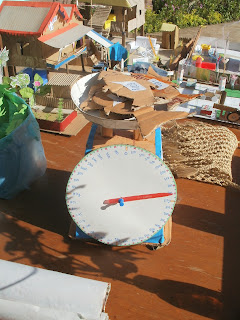I've just returned from eating out with
a group of trainers from the college. Such an invitation would have
worried me a year ago. What if I don't like the food? What do I
order? How do I eat it? Now I'm confident that most khmer food is
delicious. Foods that would make my stomach crawl such as spiders,
crickets, eggs with baby chick (yuk!) and chicken feet to name but a
few, are rarely on the menu. They are sold mainly by street vendors.
I'm quite skilled with chop sticks now but a lot of food is eaten
using a spoon.
I'm not sure what we were celebrating
today, staff don't eat out every Saturday – maybe it was just the
end of a busy week.
This week we continued with the
monitoring of Newly Qualified Teachers, those who left our college
last July, some of the first trainees I worked with. Previously I had travelled out with college management.
This time, to visit more distant districts, trainers went in pairs by
motorbike. I rode pillion with my translator and we visited 2 NQTs in
rural schools about 15km out of Sisaphon. Fortunately, we had no rain
so although the roads were very bumpy, they were not slippery.
We were greeted warmly at both schools
and I was pleased to be able to report on one good and one very good
maths lesson. The first school was in a very bad state of repair. The
teacher said that when it rains he has to stop teaching as so much
water comes through the holes in the roof. It was obvious by the
light in an otherwise dark room! The second school was beautiful.
Again wooden classrooms but well looked after and the grounds were
full of trees, flowers and shrubs. No litter. This is generally a
problem in Cambodia but the bins at this school were used properly.
The new teacher was very happy in her work and demonstrated a range
of learner centred methods and impressed me with her Teaching Aids.
The college can feel proud of having trained this young lady. When
asked what problems she faces, she told us that last year the school
was flooded during the rains and that she had travelled the 5km to
work by boat! Her other problems were no teachers book to support
teaching and lack of money to make teaching aids.
Here are a few photos. If you click on one, you can see them enlarged (if you hadn't already worked that out!)
 |
| Grade 4 classroom |
 |
| Using the environment to teach about angles |
 |
| ...and this classroom has plenty!! |
 |
| Children used twigs to make angles |
 |
| Chalkboards ensure every child participates |
 |
| The teacher reinforces the answer |
 |
| School tuck shop |
 |
| Children reading in the library during break time |
 |
| Each child puts a straw in their class pot (red for girls) to keep a record of library use |
 |
| Homes next to the school |
 |
| View behind the school |
On Thursday, all trainers gathered for
a meeting to share experiences. Some had travelled to Poipet, others
to equally distant districts of Banteay Meanchey. All had found it
very interesting as the situation is very different from that in the
town. New teachers face problems with lack of resources, one school
had no chairs or tables. Some teachers teach more than one grade at the same time,
having to cover a totally different curriculum for each. Children
drop out of school, move to Thailand or take long absences to help
parents in the fields. In rural areas it is impossible for teachers
to find study materials to develop their own subject knowledge or
resource their lessons.
All new teachers reported that they
needed more help with classroom management, working with less able
pupils and in the preparation of teaching aids from locally available
materials. This year we have been doing a lot of work in both these
areas so it was good to hear that we are on the right track. Next
week I will meet with the Director to think about what else can be
done in the light of what we found out. I am lucky to be working in a
college where staff want to work towards improving the situation for
trainees.































